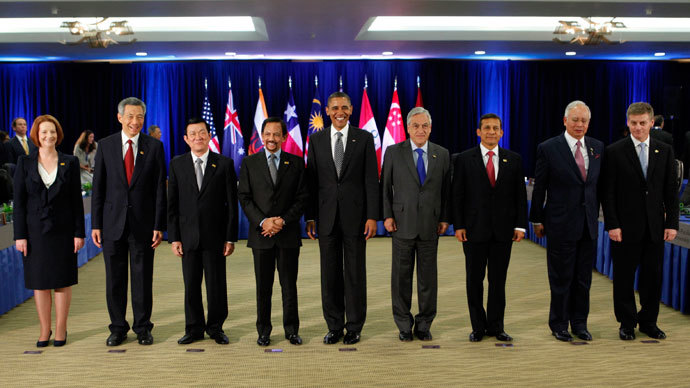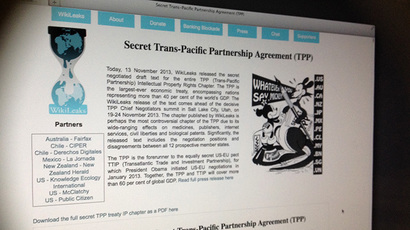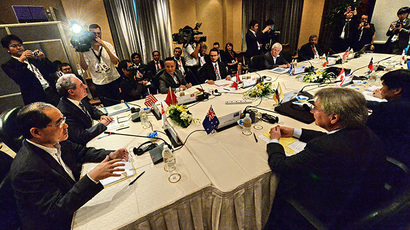Industry powers with access to TPP plans lavish money on Congress

Operatives of top global corporations, which spend great amounts of cash to lobby Congress, are also part of a small group in the US outside the Obama administration that can access working plans on the controversial Trans-Pacific Partnership trade pact.
According to data analyzed by government transparency advocate MapLight, current members of Congress received around US$24 million in the last ten years from organizations represented on an exclusive industry board, created and staffed by Congress. This board has inside access - such as not even granted to members of Congress, much less the public - to the highly-secretive negotiations of the Trans-Pacific Partnership agreement, which promises to give powerful industry players more clout over global trade rights.
The United States is currently in negotiations with 11 other Pacific Rim nations on the lucrative trade pact known as theTrans-Pacific Partnership (TPP), which aims to liberalize trade among the signees. Among the contentious issues in the TPP is that the agreement stipulates new powers for multinationals that would allow them to challenge country laws in privately run international courts. Washington has endorsed such powers in previous trade deals such as the North American Free Trade Agreement (NAFTA), but conditions in the TPP could grant multinational more powers to challenge a wider range of laws. Under NAFTA several companies including Dow Chemicals and Exxon Mobil have sought to overrule regulations on fracking, oil drilling, and drug patents.
“The United States, as in previous rounds, has shown no flexibility on its proposal, being one of the most significant barriers to closing the chapter,” said a memo from one of the participating countries obtained by the Huffington Post.
Ultimately, the pact would give corporate entities much more influence over commerce, elevating “individual foreign firms to equal status with sovereign nations,” consumer rights advocate Public Citizen says on its website.
Thus far in the multi-year negotiations of TPP, a small cadre of people have had open access to the working documents involved in the various sections of the trade pact. On the contrary, members of the US Congress, for example, must visit the offices of the United States Trade Representative to review the provisions. They are not allowed to bring anyone with them, nor can they make copies of any documents pertaining to the working agreement.
Yet aside from those in the Obama administration, only members of the United States Trade Representative’s advisory system, including the 18-member Industry Trade Advisory Committee on Intellectual Property Rights (ITAC-15), can freely access TPP negotiation documents on intellectual property.
Members of the ITAC-15 include representatives from companies like GE, Cisco Systems, Yahoo, Verizon, AT&T, and Johnson & Johnson, and entities such as the Recording Industry Association of America, Pharmaceutical Research and Manufacturers of America, and the Biotechnology Industry Organization.
The ITAC-15 does not include public advocacy organizations, academics or any non-industry experts.
The industry trade advisory system was created and staffed by members of Congress. In fact, the ITAC-15 is made up of several top political spenders that have offered millions of dollars to influential Congress members in recent years, data organized by MapLight shows.
MapLight found that - from Jan. 1, 2003 to Dec. 31, 2012 - the 18 organizations that have representatives on the ITAC-15 gave almost $24 million to current members of Congress in that time period via political action committees, among other avenues that are legally required to be disclosed.
AT&T has given over $8 million to current members of Congress, more than any other ITAC-15 entities.
Republican House Speaker John Boehner has been given $433,350 from ITAC-15 organizations, more than any other individual in Congress.
Congressional Democrats have gotten $11.4 million from the organizations, while Republicans have received $12.6 million.
A handful of Congress members sponsoring legislation that would give the Obama administration more power over the congressional process of approving TPP - barring amendments to the pact, for example - have received a total of $758,295 from the ITAC-15 groups. These members include: Senate Finance Committee Chair Max Baucus ($140,601), Senate Finance Ranking Member Orrin Hatch ($178,850), House Ways and Means Committee Chairman David Camp ($216,250), House Ways and Means Subcommittee on Trade Chairman Devin Nunes ($86,000), and House Rules Committee Chairman Pete Sessions ($136,594).
Meanwhile, a new report released this week showed that US corporations spent $185 million in 2012 alone via nonprofit groups that are not legally required to divulge either their sources of funding or how they spend that money.
“Ranking among the biggest donors are energy giant Exelon Corp., health insurer WellPoint Inc. and technology titan Microsoft Corp.,” the Center for Public Integrity said in its findings.
“The millions of dollars in corporate expenditures highlighted by the Center for Public Integrity’s research flowed to more than 1,000 politically active nonprofits, from major trade associations such as the U.S. Chamber of Commerce to pro-business alliances such as the Fix the Debt Coalition.”














